“In his debut, [N. J.]Campbell has written a page-turner, an onion peel of a story surrounding nothing less than the central questions of human existence. The reader is led down a rabbit hole and back out again, confused, afraid, but nevertheless also ever so slightly amused. This is a weird little book full of momentum, intrigue, and weighty ideas to mull over.” – Publishers Weekly, April 10, 2017
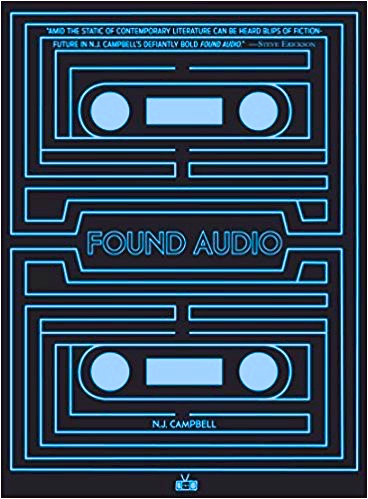 Though it deals with nothing less than the meaning of existence, the nature of reality, and ultimately, a search for the legendary “City of Dreams,” which has haunted the lives of writers and philosophers for centuries, Found Audio is also great fun. Debut author N. J. Campbell makes his own rules here as he creates a novel which is entertaining and, at times, exciting, even as it also deals with philosophical questions which have been the subjects of treatises, novels, plays, and poetry since the beginning of time. Who we are, where we are going, what we see as the nature of reality, how importantly we regard our dreams, and the universal need to give meaning to our lives are issues for most of us, and what Campbell has to say is not new. What is new is his enthusiastic, down-to-earth treatment of these ideas within a novel which is experimental and often charming, drawing the reader into participating in a search for truth through mysterious audio tapes which have been found by an unknown narrator who has traveled the world to exotic places.
Though it deals with nothing less than the meaning of existence, the nature of reality, and ultimately, a search for the legendary “City of Dreams,” which has haunted the lives of writers and philosophers for centuries, Found Audio is also great fun. Debut author N. J. Campbell makes his own rules here as he creates a novel which is entertaining and, at times, exciting, even as it also deals with philosophical questions which have been the subjects of treatises, novels, plays, and poetry since the beginning of time. Who we are, where we are going, what we see as the nature of reality, how importantly we regard our dreams, and the universal need to give meaning to our lives are issues for most of us, and what Campbell has to say is not new. What is new is his enthusiastic, down-to-earth treatment of these ideas within a novel which is experimental and often charming, drawing the reader into participating in a search for truth through mysterious audio tapes which have been found by an unknown narrator who has traveled the world to exotic places.
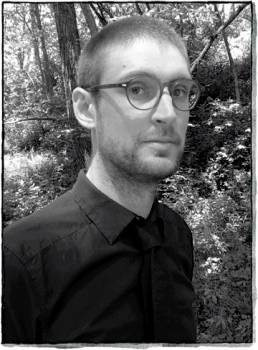 In a Foreword, the author talks about having received a manuscript from an unidentified writer in 2006. The writer of the manuscript is asking the author to find a publisher for the work, which begins with an introductory letter from Amrapali Anna Singh, PhD., described as the transcriber of a “rough, unfinished first draft of a non-fiction work in progress.” The transcriber goes on to provide a note on the text. She had been visited in 2006 by a man named Pierre Cavey while she was working in Dutch Harbor, Alaska. He had come “directly” from Buenos Aires by way of Shanghai, Allahabad (in Uttar Pradesh) and Antanarivo, the capital of Madagascar. With him, he brought three audio tapes, and he was prepared to pay her a significant sum in cash for two days of work on the tapes in an effort to determine where they came from, how they were produced, and who might have recorded them. All of the tapes are labeled as coming from the Biblioteca Nacional de Investigacion de Buenos Aires, and the writer announced that he would take them with him at the end of the two-day window. Though the transcriber was not allowed to make copies, she made them anyway, later discovering that Pierre Cavey was wanted by both the library in Buenos Aires and the U.S. Embassy in Argentina for his theft of the tapes.
In a Foreword, the author talks about having received a manuscript from an unidentified writer in 2006. The writer of the manuscript is asking the author to find a publisher for the work, which begins with an introductory letter from Amrapali Anna Singh, PhD., described as the transcriber of a “rough, unfinished first draft of a non-fiction work in progress.” The transcriber goes on to provide a note on the text. She had been visited in 2006 by a man named Pierre Cavey while she was working in Dutch Harbor, Alaska. He had come “directly” from Buenos Aires by way of Shanghai, Allahabad (in Uttar Pradesh) and Antanarivo, the capital of Madagascar. With him, he brought three audio tapes, and he was prepared to pay her a significant sum in cash for two days of work on the tapes in an effort to determine where they came from, how they were produced, and who might have recorded them. All of the tapes are labeled as coming from the Biblioteca Nacional de Investigacion de Buenos Aires, and the writer announced that he would take them with him at the end of the two-day window. Though the transcriber was not allowed to make copies, she made them anyway, later discovering that Pierre Cavey was wanted by both the library in Buenos Aires and the U.S. Embassy in Argentina for his theft of the tapes.
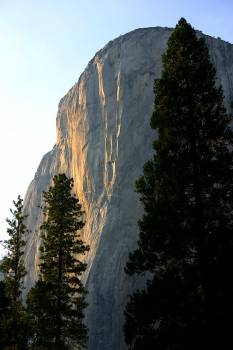
El Capitan, a trail on the Matterhorn, which Bianca and Julien hiked while under the influence of a drug.
As the tapes begin in 1998, the narrator, identified as a male, age 48 – 52, with a Midwestern accent, talks about going “down to the bayou,” in 1991, to try to find an old man named Otha Johnson, who works as a bounty hunter of snakes – the big-game species of snakes not native to Louisiana and which are now considered invasive species. When he finally locates Otha, the two men drive to Otha’s cottage, deep in the bayou. On the ride, the narrator, almost in a trance, obsesses about a former girlfriend who once climbed El Capitan on the Matterhorn on a moonless night while under the influence of “Blue,” and he remembers meeting her to talk about it later. Once at Otha’s house at the bayou, the speaker and Otha wade into the swamp, take a small wooden boat from behind Otha’s cottage, and head out. The narrator cannot think of a single question to ask Otha, and he begins to wonder if he has been drugged, his head feeling like “a certain type of trip I’ve had with shamans in Thailand….The world was climbing inside me and it was desperately intent on taking away from me whatever part of myself I held from it…And this went on for hours until, after being there for a thoughtless infinity, I started to forget about what my life had been before that experience.” On coming to, he finds himself back in the marsh, the entire boat ride a blank. As Otha says, “Dare ain’t always an easy explanation of a life.”
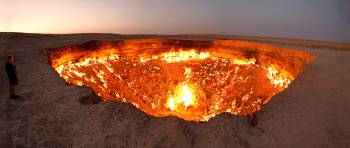
The Darvaza Gas Crater, known in Turkmenistan as the “Door to the Abyss,” was a natural gas field which collapsed into an underground cavern. Photo by Tormod Sandtorf
Tape II, also recorded in 1998, features the same journalist, who has decided to go after stories in a new way. After concluding that he must have made up the whole story of Otha and the swamp, he takes himself to Turkmenistan, meeting with fellow journalist Julien Belmonte, who often traveled with Bianca, the narrator’s former girlfriend. Julien is on his way to the Darvaza gas crater also known as the “Door to the Abyss,” and he is convinced that the burning crater is “like chasing the City of Dreams – the reader always expects more than is actually there.” The City of Dreams, for him, is an old myth, which he likens to Dr. Livingstone’s “Plateau of Dreams” in Burundi, to Napoleon’s “Caravan of Dreams” before the Battle of Waterloo, and to Cortez’ story, told to the King of Spain, about the “Festival of Dreams.” Even the Egyptians “have hieroglyphs than can be translated as ‘The City of Sleeping Worlds.’ “ All, Julien believes, are “mirages at the margins of conjecture and hearsay.” Soon the narrator is called to Kowloon, where he sees graffiti about the City of Dreams and meets an old man who talks about the City as being “different for everyone, but also the same for everyone.” Later, in Mongolia, the journalist goes on to the Singing Dunes in the Gobi Desert, where he finds a city that smells of saffron, a repeating image, and where he also sees “a being,” sitting at the City of Dreams. Eventually, the comment of an old monk comes back to him, “Are you the dreamer or are you the dream?”
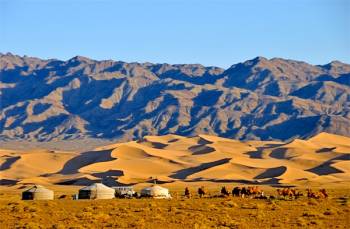
The Singing Dunes in Kongoryn Els in Mongolia, a destination of Julien, are also known as the “Field of Sleep.”
Tape III describes the narrator’s lack of dreams for years after that, during which he agrees to cover a chess match in Istanbul and connects with The Turk, who offers comments on his life. Always, he is asking “What is behind the dream?” Though it ends, at this point, the novel brings events up to the present. Ten years have passed, and information arrives regarding the transcriber, Amrapali Singh, and the later lives of Bianca Terrazas and Julien Belmonte. The “author” of the novel insists that it is Amrapali Singh and not himself who is the author of the book, but who knows? As of March, 2017, he does not know what has happened to any of the people connected with the manuscript, he says, nor does he know whether they are alive or dead. The book ends with his conjectures as to who the narrator might be, where the various other characters have gone, and where they might yet be going. A novel that is fresh, often charming, and full of insights into the need for a City of Dreams and what these dreams represent for us all.
Photos, in order: The author’s photo is from https://twodollarradio.com/
Bianca and Julien hiked the El Capitan trail on the Matterhorn while under the influence of a drug. https://en.wikipedia.org/wiki/
The Darvaza Gas Crater in Turkmenistan, known locally as the “Gates of Hell” or the “Door to the Abyss,” was a natural gas field which eventually collapsed into an underground cavern beneath it creating a crater. Photo by Tormod Sandtorf: https://www.flickr.com/people/14585659@N07 , posted to https://commons.wikimedia.org/
The narrator also goes to Mongolia to the Khongoryn Els, where the Singing Dunes are located. These are also known as the ” Field of Sleep.” https://travel.prwave.ro/
